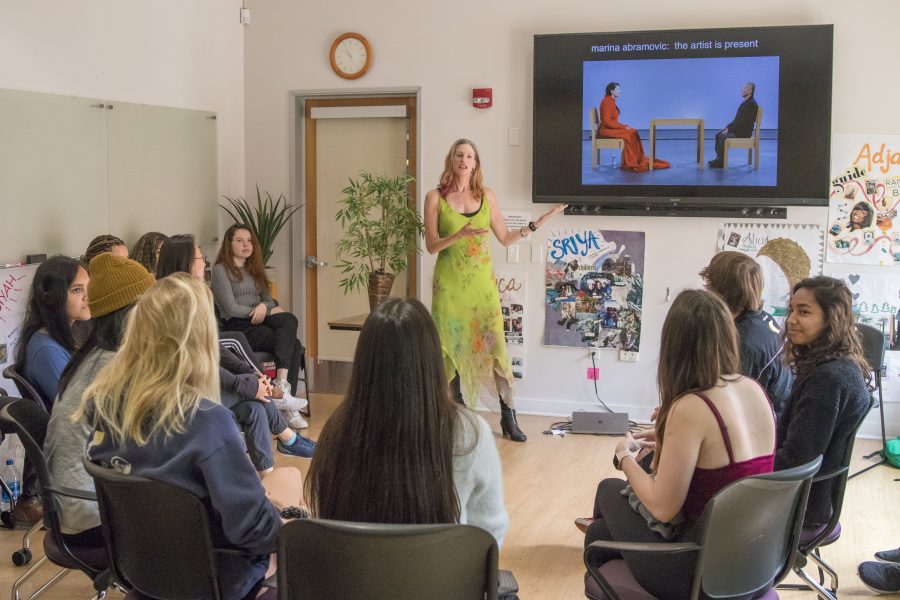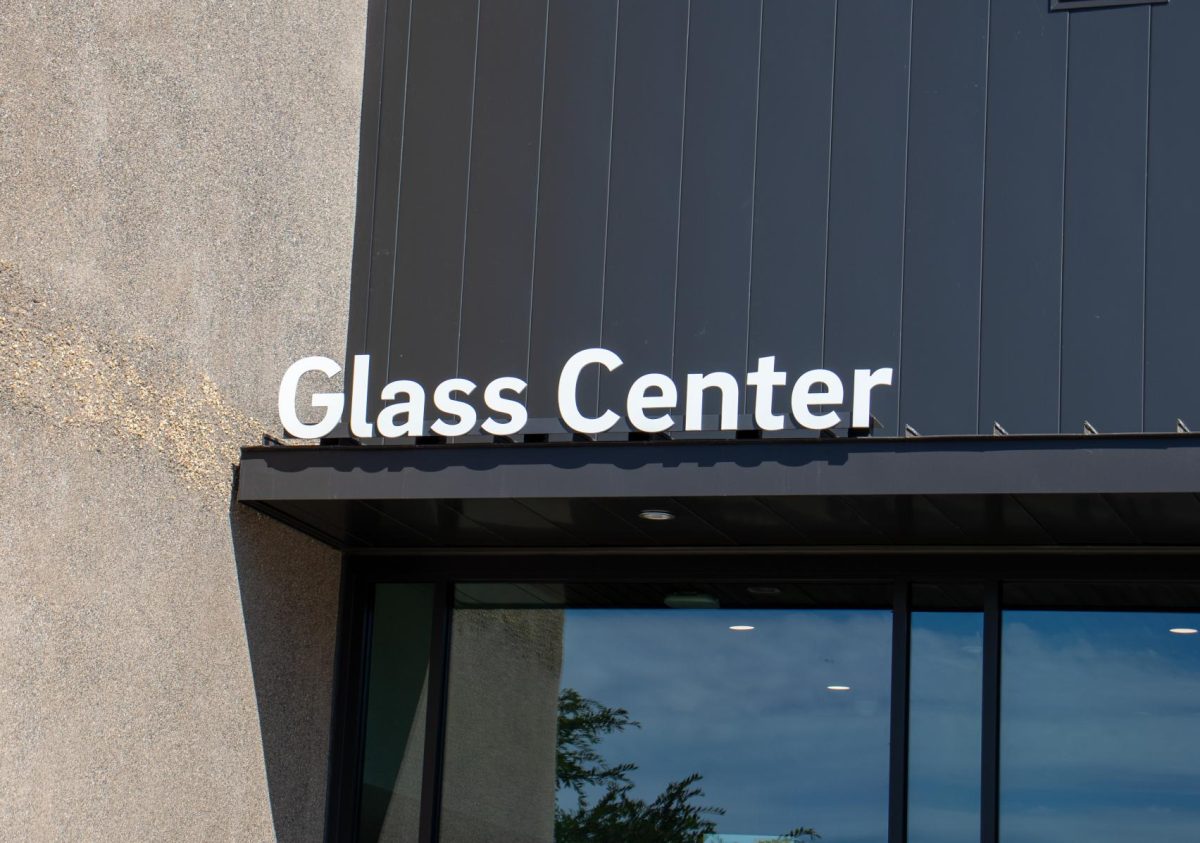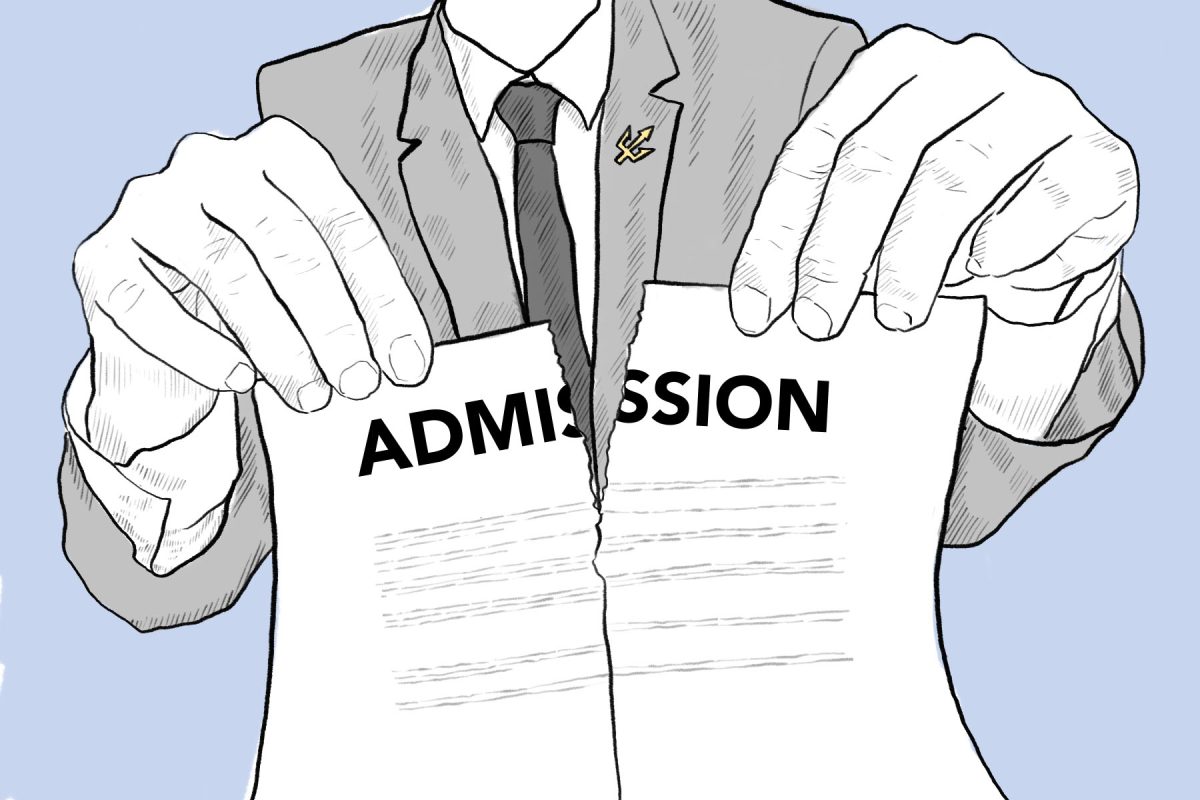Professor Karen Dobkins discusses her vision of integrating a well-being class into the undergraduate general education curriculum.
Every Thursday morning in the Women’s Center, gathered high above the bustle of campus, a group of students explores what it means to be human. They’re a part of “Principles of Clarity”, a one-unit seminar headed by psychology Professor Karen Dobkins. The class revolves around practicing mindfulness through introspection, discussions of experiences, and meditation.
This particular morning while on the subject of eye contact, Dobkins goes from student to student, taking a long pause in front of each to gaze into their eyes. A peaceful silence falls as she has a beautiful moment of connection with each student, uncovering joy, sorrow, wonder, and pain. Then she sits back down.
“I could look at each of you for an hour. There’s so much joy in seeing someone.”
Dobkins joined UC San Diego’s psychology department as a professor in 1995. Coming from a background in neuroscience, she conducted research on the perceptual and cognitive development of infants and children…up until 5 years ago. But then that changed.
“I realized that the research I was doing wasn’t feeding my soul anymore. Sure, I was ‘successful’, publishing papers, getting grant money, etc., sort of living the ‘academic dream’, but I wasn’t fulfilled by the dream, and I had to really take an honest look at myself and say, ‘Why am I not really happy with my research?’ And the answer was that the questions I was asking weren’t the questions I was dying to know the answers to.”
After 25 years with the university, Dobkins found a question that she was dying to know the answer to: Why was she seeing more and more depression, anxiety, and loneliness in her students?
“I’ve seen students more worried about their future; I’ve seen them not really present in the classroom. And it saddens me because it wasn’t like that when I was in college. In fact, when I was in college, none of us were worried about what we were going to do after college. When we were done, we all sort of went, ‘Ok, now I’ll figure out where I’m going next.’”
Dobkins further spoke about how she relates to students during her office hours.
“When I hold my office hours for my big undergrad class, which is PSYC 106, I’d say almost the whole two hours of my office hours, the room is filled and we’re talking about life because this is what the students want…they are asking for guidance.”
With her growing concern for her students’ mental health, Dobkins shifted her research to the subject of mindfulness and well-being. Despite having joined a field where she had no experience and reputation, she’s much more content pursuing research that genuinely interests her.
Data from her lab shows that UCSD students are experiencing levels of loneliness higher than the national average.
“Based on the UCLA Loneliness Scale, on average across all universities the mean score [of loneliness] is something like a 39, 40. And we at UCSD are at a 46, 47. So we’re way above the national mean,” she explained.
So why are UCSD students so lonely? Dobkins believes it comes down to a number of factors: the partitioned layout of the campus, the academically competitive atmosphere, and the large population of transfer and international students who tend to experience higher rates of loneliness.
“International students are literally 10,000 miles away from home, away from their families, in a completely new environment,” said Dobkins.
As for transfer students, she continued, “It’s hard to get connected and find your community. People have already made their bonds during freshman and sophomore year, and now here you are, a junior transfer student coming in.”
Dobkins will further explore this question in an upcoming town hall meeting titled “Why is UCSD Lonely?” She’ll be joined by speakers Josh Abrego, class of ’19, and Earl Warren College junior Zahabiya Nuruddin, who have both led various mental health awareness efforts at UCSD. The purpose of the town hall meeting is to introduce Dobkins’ proposed solution to UCSD’s well-being predicament: the Learning Sustainable Wellbeing (LSW) initiative.
The ultimate goal of the LSW initiative is to implement a mandatory, 1-unit seminar on well-being — like Principles of Clarity — to be completed within the first two years of an undergraduate career. It is the responsibility of the university, Dobkins asserts, to cultivate mental wellness for its students through its curriculum.
“I really believe there will be a point in our evolution where humans look back and go, ‘Yeah, of course 8 billion people all agree that schools have some well-being course.’
I think it’s the responsibility of the education system to bring in that component of education to the curriculum, which is how to be a human, how to actually navigate.
“I don’t have to convince you that there’s so much craziness in this world; there’s so much hatred, there’s so much killing, judgment, why? I really believe if all children were brought up consciously, we would eradicate much of that stuff in a couple hundred years.”
Since the initiative’s inception in 2018, Dobkins has been working with various UCSD administrators to realize her efforts. She hopes to enact a two-year pilot program for the LSW initiative during which one of the six undergraduate colleges would adopt the seminar as a general education requirement. If this initial program proves to be effective for students’ well-being, then the university could further expand it to a campus-wide General Education requirement.
This would mean scaling the seminar, which is currently taught to a class size of 25, up to a 100-person lecture. Dobkins noted that the LSW initiative would also require multiple professors (about 11 more), including herself, to lead their own well-being seminar. This would cover about 1200 students (half freshmen, half sophomores) in one year.
“Part of my dream with LSW is that it’s the professors themselves who teach these well-being courses. You could hire outside people who are in fact trained in well-being. But I like the idea of the professors teaching these courses because professors need to learn to practice well-being too, and they say that the best way to learn something is to teach it! So the professors would be learning alongside the students.
“I think if the professors are teaching these courses it would also help with the connection between profs and students because that’s lacking on this campus. Students don’t feel seen by their professors.”
Self-Care, Commodified
Coping with Eating Disorders and Overcoming the Social Stigma to Treatment
CAPS at UCSD: Get Well Soon?
In collaboration with several administrators at UCSD, Dobkins and her team are currently looking at academic records to see if there’s a relationship between GPA and well-being. Additional research in support of the LSW initiative includes examining the correlation between loneliness and mindfulness in students. Dobkins and psychology graduate student Taylor Bondi have found a strong, negative correlation between the two –– it’s clear that practicing mindfulness could very well be a solution to UCSD’s loneliness problem.
Dobkins and her lab have also been gauging student interest in having a mindfulness seminar as a GE requirement. Collecting data from over 5,000 students, the vast majority of students see the value of a one-credit, well-being course. This held true with the undergraduates I surveyed myself.
Nelson Espinal, a Roger Revelle College freshman, said, “I think it would have been beneficial to have a class like that since it could have provided a few tips on having better mental health. I haven’t encountered many mental health resources during my time here. I know there is Counseling and Psychological Services, but I don’t think it should be therapy or bust.”
Warren junior Alex Rickard agreed, saying that such a class would be especially helpful to first-year students.
“I think that too many teenagers come out of high school without proper coping mechanisms for failure and even being average,” Rickard said. “Giving students these abilities at the start of their college career would prepare them for success and increase the quality of a UCSD education. Maybe it could even be packaged with the first-year experience classes.”
Dobkins’ data shows that, among those who say they would want a well-being class, older students are more likely to express interest.
“If you look at the distribution of people who express interest in a 1-unit well-being course, it’s shifted toward the older students, which I think makes sense because I think the longer you are in college, the more you realize you need it. You look back and say, ‘Yes, that would’ve been nice to have a well-being class,’” said Dobkins.
This was certainly true for the students who were nearly or recently graduated. Alma Trinidad Javier, a John Muir College senior, reflected, “I believe a mindfulness class would have been beneficial. It would have been a good way to know how to deal with stress. I think it’s important to make it mandatory as well because we all deal with stressful situations in college. We all go through it.”
Rebecca Chhay, Muir class of ’18, shared a similar sentiment: “I would have loved a seminar. I’ve done some meditation retreats before, and whenever I mentioned it to other students they’re always really interested in hearing about my experience. I think it would be popular.”
That’s not to say, however, that every student is totally on board with the LSW movement. Jenny Lee, a Sixth College freshman, expressed, “Ideally, I think any class on how to do life is helpful. But realistically, I don’t think I could have gotten comfortable talking about these topics with people I don’t know. I think I would be too shy to talk about something I consider to be a bit personal. I would prefer to learn these things one-on-one with a friend or counselor.”
Lee continued, “It’ll feel like a chore at first — like how people see their writing sequences — but then if the class is good enough in capturing our attention, it’ll work.”
Having established that student interest in a well-being class is there, now it’s just a matter of pushing for change.
Dobkins said, “In my opinion, implementing well-being classes at UCSD will require a paradigm shift, a real change in how we’re thinking about education. It will take realizing that students need more than just academic guidance.”
The town hall meeting “Why is UCSD Lonely?” will take place on Tuesday, June 4 from 7 p.m. to 9 p.m. in Price Center East Forum.
Photo courtesy of Francesca Hummler.







